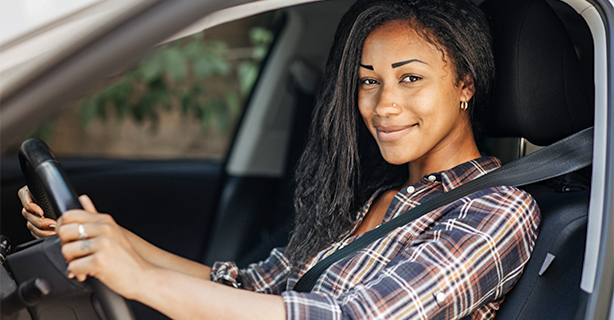New car insurance
0 min. read
In most states across the country, the law requires you to have car insurance. While state laws and pricing (rate) requirements vary dramatically from state to state, simply put, if you have a new car that you own or lease, you need car insurance. Explore Dairyland’s cheap car insurance options to find the coverage that fits your lifestyle and budget.
When should you add insurance to a new car?
As you shop for a new vehicle, getting insurance should be a part of your plan from the beginning. Here are some things to keep in mind:
If you don't have an existing policy, you should speak with an insurance agent before you buy your new vehicle. That way, you'll be able to get an idea what it'll cost to cover the vehicle you're considering, so you can get an insurance policy in place before you drive the vehicle off the lot.
If you do have an existing policy, let your insurance agent know ahead of time that you're shopping for a new car and find out what you need to do to make sure you're covered when you buy the vehicle.
Once you've made a decision on what to buy or lease, notify your insurance agent as soon as possible so you'll be covered. Be prepared to provide the year, make and model, vehicle identification number (VIN), and lien information. They'll be able to update your policy right away.
Most insurance companies provide a grace period for you to notify them about adding a vehicle to an existing policy. Understand the coverage provided may not adequately cover you and your new vehicle.

What’s the minimum coverage available?
Generally, the minimum coverage mandated by law will only cover the damages to the other vehicles and occupants in an accident you caused. Minimum coverage won't cover damages to you or your own vehicle. Understand the minimum required coverage can often be inadequate to pay for damages you might cause.
You need to decide if the value of your vehicle is worth the extra premium it'll cost you to completely protect it. Consider buying higher limits of coverage to give yourself greater peace of mind.
What’s the difference between liability coverage and full coverage?
The terms “liability only” and “full coverage” can mean different things to different people.
Depending on the state you're in, you'll normally be required to at least cover the damage or injury you cause others. That's liability insurance.
"Full coverage" isn't actually an insurance product—it's a combination of multiple coverages, usually including liability, collision, and comprehensive. But keep in mind, what's included in "full coverage" can vary by provider. In most cases, "full coverage" will pay for not only the damage you've caused to others, but also the damage to your own vehicle.
What other auto insurance coverage options are available?
There are add-ons to car insurance policies that cover:
The cost of renting a car
Towing
Emergency roadside assistance
Custom equipment
If you'd like to explore those options, it's a good idea to talk with an insurance agent who can explain everything available, how it helps protect you, and how much it costs. Your new car is an investment. You want to make sure you're adequately covered when an accident happens. We can help you understand what's available so you can make an informed decision.
Should I add other drivers to my auto insurance policy?
Insurance companies require you to list everyone of legal driving age—including teenagers—in the household, and anyone else who might drive your vehicle on a regular basis. When you buy a new car and add insurance, give some thought to others who might be driving it. To include additional drivers on your policy, you'll need their full name, date of birth, and driver's license number.
What factors impact insurance costs?
Where you live, how many miles you drive, what you use your car for, and where you drive—especially if it's a heavy traffic area—can all affect your rates. So can your driving record. Your insurance agent will ask you questions to discover the type of insurance that makes sense for you.

Keep your vehicle covered and compliant.
Get an auto insurance quote today.
Do you have to speak with an insurance agent, or can you buy insurance online?
At Dairyland, we provide options that let you choose. You can go through our website, call us directly, or find an independent agent near you.
Are there ways to save on insurance premiums for your vehicle?
One of the benefits of working with Dairyland is the number of payment options we offer. By paying more up front or making larger scheduled payments, you can improve your price. You'll see the lowest overall cost when you pay your term premium in full.
You may also qualify for insurance discounts for things like owning a home or having prior insurance. Most of all, it pays to have a good driving record. The cleaner your record, the more likely you'll get a better rate for your insurance policy.
Prepare before buying a car
Plan for insurance coverage before you get behind the wheel. Don't assume you can just take care of things after you've bought a vehicle. Be open and honest with your insurer so they can work with you to make sure you have the coverage you need, when you need it. That way, you can drive your new car with the peace of mind of knowing you're protected if something goes wrong.
Related links
At Dairyland, we feel strongly about your safety, and we promote that through our defensive driving discount. Check out what you might be able to save today.
Also, make sure you have the comprehensive and collision car insurance coverage you need on the road.
The general information in this blog is for informational or entertainment purposes only. View our blog disclaimer.
*Data accuracy is subject to this article's publication date.







